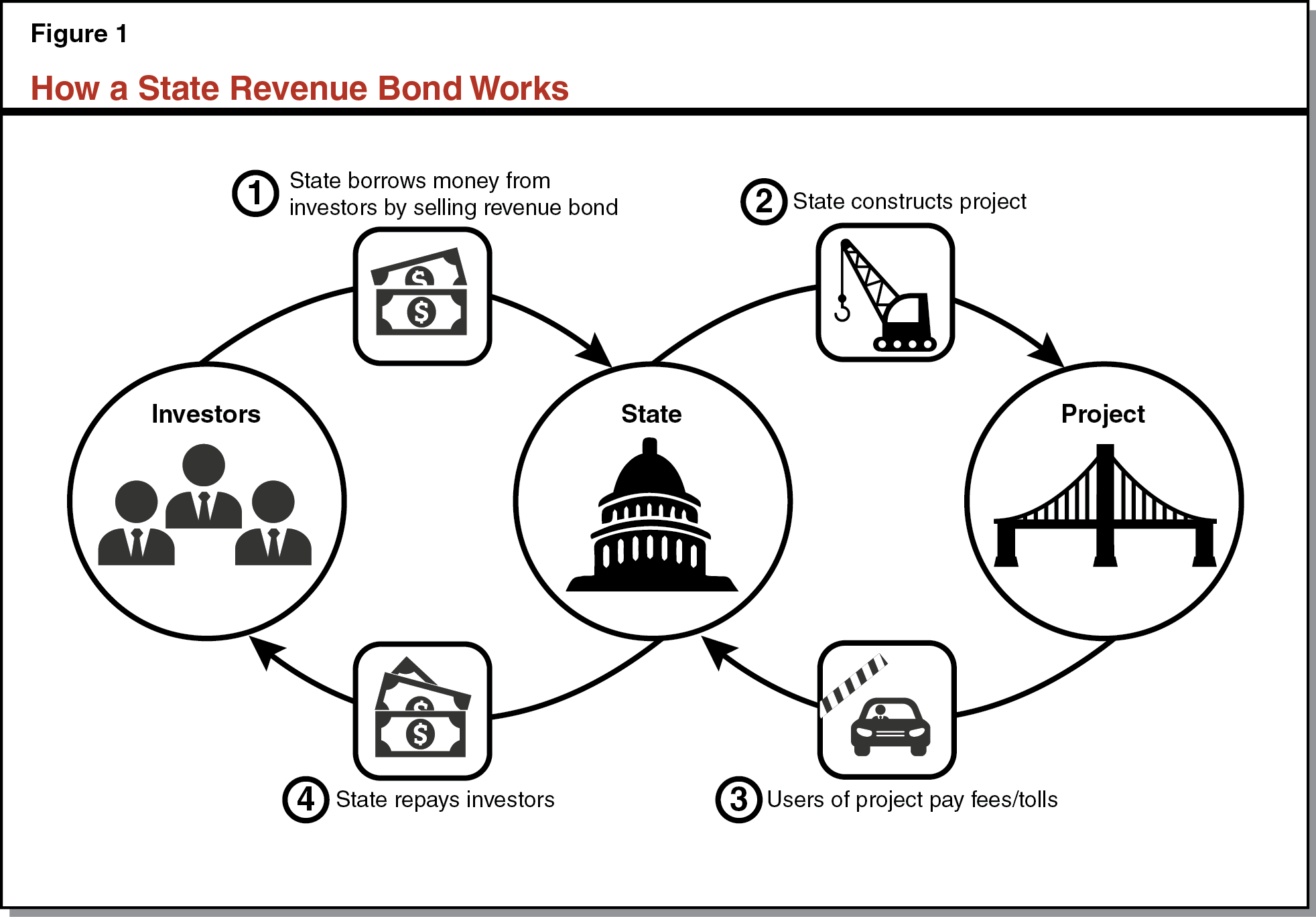53
requires any public infrastructure project over $2B to be voter approved.
Summary
This one is a little dense, so let's get some vocab down.
When the state decides to build a public infrastructure project, it issues revenue bonds – debt that is paid back by the use of the project. For example, if it's a bridge, the money from the toll goes to pay back the cost of building it. If it's a hospital, the users pay hospital fees, which go to pay back the revenue bond. At the moment, revenue bonds do not have to be voted on by the public.
When the state decides to build a public infrastructure project, it issues revenue bonds – debt that is paid back by the use of the project. For example, if it's a bridge, the money from the toll goes to pay back the cost of building it. If it's a hospital, the users pay hospital fees, which go to pay back the revenue bond. At the moment, revenue bonds do not have to be voted on by the public.

Graphic provided by the Legislative Analyst's Office[3]
If Prop 53 passes, revenue bonds totaling $2 billion or more (e.g. that $60 billion High Speed Rail) would require statewide voter approval first. The intent of the prop is to prevent massive state debt because of poorly planned or financed projects. Currently, it's unclear whether this would impact local projects. If it did, people in LA, for example, would have to vote on something that only impacts SF. Neither side wants that.[4]
Complexity of issue: 🤔🤔🤔🤔🤔
Money involved: 💸💸💸💸💸
Lopsided support? Mostly towards No
Projects affected? High Speed Rail, Twin Tunnels Project
Money involved: 💸💸💸💸💸
Lopsided support? Mostly towards No
Projects affected? High Speed Rail, Twin Tunnels Project
Why should I care?
Say the High Speed Rail is built, and nobody uses it because it's overrun with rats. High speed rats. This is where the two sides disagree. Supporters of Prop 53 say, to pay back the bond, the state has to pull from the General Fund (i.e. taxpayer money honeypot) So it should make sense that you should have a say in whether a project should be built or not, right? You, as a tax-payer, are paying for it if it fails. Well, the opposition says that revenue bonds, by definition, don't put the tax-payers at risk, just the bond-holders and the users.[4 @ 19:00, 25:55] If the High Speed Rail is over-budget, then the price for a ticket simply becomes more expensive. (You can continue down this rabbit-hole, and eventually get to taxpayers again.)
Why is this even on the ballot?
Dino Cortopassi, farmer and philanthropist, has spent over $4 million to get this passed, in an effort to stop "blank check debt" from legislators. Some say this measure is to personally stop the Twin Tunnels or High Speed Rail project.[8]
Any gotchas?
The proposition has no exemptions for emergencies, like a natural disaster.[1] Proponents argue that wouldn't be a revenue bond in the first place.[4] But there's an example in 1910 where we have.[4 @ 22:40] [We haven't been able to verify the example they cite in the podcast. Any leads?]
More reading
Information last updated: Oct 23, 2016
[2] Ballotpedia details
[3] Legislative Analyst's Office summary
[$] Voter's Edge: where's the money coming from?
[4] KQED: podcast debate
[8] SF Chronicle Editorial Board
[9] LA Times Editorial Board
[10] Bakersfield Californian Editorial Board
[11] Sac Bee Editorial Board
Note: we intentionally omit the official arguments/rebuttals found in the official voter guide. We believe they exaggerate claims, mislead through emotions, and use ALL CAPS irresponsibly.
Mostly impartial information
[1] Full text of the proposition[2] Ballotpedia details
[3] Legislative Analyst's Office summary
[$] Voter's Edge: where's the money coming from?
[4] KQED: podcast debate
Arguments FOR Prop 53
[6] Daily Press EditorialArguments AGAINST Prop 53
[7] Mercury News Editorial Board[8] SF Chronicle Editorial Board
[9] LA Times Editorial Board
[10] Bakersfield Californian Editorial Board
[11] Sac Bee Editorial Board
Note: we intentionally omit the official arguments/rebuttals found in the official voter guide. We believe they exaggerate claims, mislead through emotions, and use ALL CAPS irresponsibly.